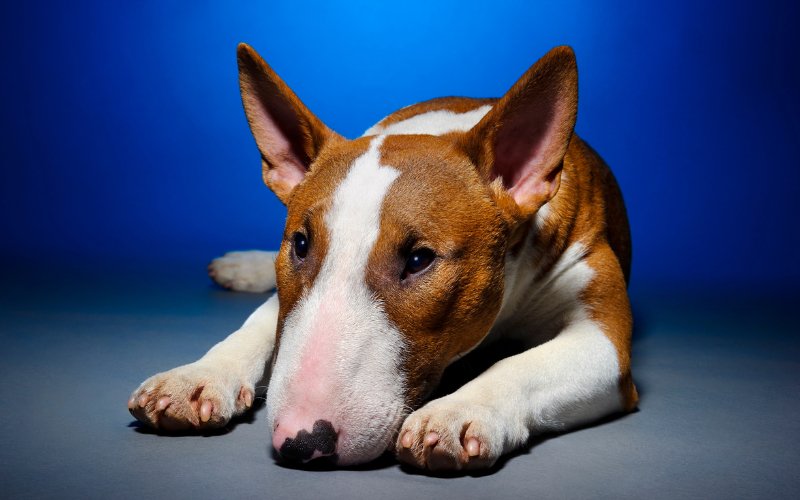
Separation Anxiety in Bull Terriers
|
Time to read 4 min
|
Time to read 4 min
©AntonMatveev via Canva.com
Does your Bull Terrier become anxious when left alone in the house? Does your furry companion follow you from room to room?
Well, Bull Terriers are capable of feeling a lot of emotions. This includes loneliness and separation anxiety as well. When a Bull Terrier gets very stressed and anxious when left alone, this is generally called separation anxiety.
Like all dogs, Bull Terriers are pack animals and may become scared to stay alone. When the owner goes out and leaves their Bull Terrier alone, they may develop separation anxiety. Even if you leave your Bull Terrier with interesting toys, treats, and a safe place to relax, they will still need his human companion to feel happy and comfortable.
Bull Terriers who are suffering from separation anxiety may need extra support, love, and patience.
There is no clear evidence that shows why Bull Terriers develop separation anxiety. It can even develop in a perfectly healthy pooch. Certain situations that may trigger separation anxiety in Bull Terriers include:
Many Bull Terriers become scared and find it difficult to stay alone and cope with isolation. They can exhibit their anxiety and stress in many different ways. Bull Terriers that show one or more of the following symptoms may have developed separation anxiety:
By knowing the signs of separation anxiety, you can take the right measures to regulate your Bull Terrier's behavior.
As a responsible Bull Terrier parent, you can do many things for your Bull Terrier to overcome their separation anxiety. The ultimate objective is to have a Bull Terrier that is relaxed, self-assured, and stress-free.
Here are some ways that may address separation anxiety in Bull Terriers:
You must establish a daily routine for your Bull Terrier. This includes regular mealtime, potty time, exercise and training time, and even scheduled playtime.
Your Bull Terrier will understand when they will get attention from their human companions and when not. This will help them to spend the remaining time for a nap and play with their favorite toys.
You must ensure that your Bull Terrier gets enough exercise and physical activity. Physical and mental stimulation can ease out your Bull Terrier's stress and anxiety. Additionally, it could potentially help them get rid of the pent-up energy.
You can meet their exercise requirements by:
A healthy and balanced diet is essential for your Bull Terrier. It contributes to their overall health and well-being. The ideal food for your Bull Terrier is the one that ensures all the nutrients your furry pal needs for growth and development. You should give them foods that are tailored to meet their needs.
Rewards like treats and playtime are the motivators for your Bull Terrier. You can reward them for showing calm behavior. Never punish your Bull Terrier for showing anxious or undesirable behavior.
Some natural supplements are a great way to relieve anxiety and calm your Bull Terrier's nerves. They are completely natural and don't have any side effects. Other than keeping your Bull Terrier calm and anxiety-free, these things also have other useful health benefits.
You must provide a secure area for your Bull Terrier to relax. This will help them to avoid any destructive and undesirable behavior. The area or surface for your Bull Terrier’s relaxation can be a mat, crate, or bed.
If you are a new Bull Terrier parent and the symptoms of separation anxiety become severe, consider hiring a dog behaviorist. A professional dog behaviorist will help you to figure out the best ways to deal with separation anxiety in Bull Terriers.
Your Bull Terrier can be trained to be left alone in the house and to deal with separation anxiety. Here's how you can help your Bull Terrier:
Crate training: Crate training is the least stressful way to help your Bull Terrier. Ensure that your Bull Terrier's crate is associated with something pleasant.
Potty training: Your Bull Terrier must be potty trained. It will help them not create a mess inside the house.
Obedience training: Train your Bull Terrier to understand the basic commands like sit, stay, and lie down.
Structure and consistency are the most important factors for successful training. Keep training sessions short and don’t exhaust your Bull Terrier. The key is to show patience and lower your expectations.
Always remember that when you bring home a Bull Terrier, you are committing to a long-term relationship. Bull Terriers love companionship, so you must dedicate quality time to your fur buddy and ensure that their needs are being met. This will help them to become well-rounded and socially healthy pets.
Give a loving home to your Bull Terrier, your furry child just needs your love and attention!
Hope you enjoyed reading this article about separation anxiety in Bull Terriers!